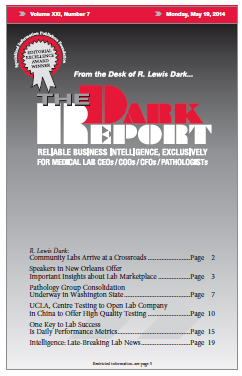CEO SUMMARY: To fill the unmet demand for quality clinical laboratory testing in China, a partnership between pathologists at UCLA and Centre Testing International Corp. of Shenzen have built and will operate a lab facility in Shanghai. The new lab will open by late September and will initially provide core lab testing services to pharmaceutical …
UCLA, Centre to Open Lab in China to Offer High Quality Testing Read More »
To access this post, you must purchase The Dark Report.


